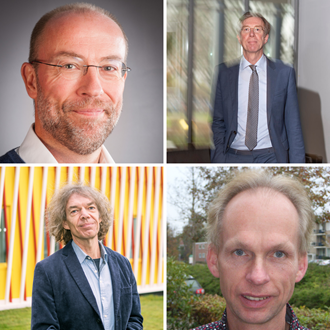FEB-researchers receive 2 million in NWO-grants

Professors Bob Fennis, Herman de Jong, Robert Lensink and Paul Elhorst have received over 2 million in the Open Competition by NWO (Dutch Research Council). The aim of the Open Competition is to facilitate excellent, non-programmed, curiosity-driven research by senior researchers. They can carry out research into a subject of their own choosing without any thematic constraints.
Fennis’ research will focus on when and why consumers fall prey to deceptive advertising, fake news and misinformation. “We want to develop and test a new model that can predict when we are more and when we are less gullible. And how we can effectively defend ourselves against deception and misleading information.”
Herman de Jong and Abe de Jong want to investigate the function of the Amsterdam stock exchange during a highly dynamic period of growth, structural change, and crisis (1870-1940). De Jong is excited about the grant. “Apart from the new research avenue we can start, this grant also allows us to deepen the collaboration between between our Groningen Growth and Development Centre (GGDC), and our Centre for International Banking, Insurance and Finance (CIBIF) with the business history centres at Utrecht University and Erasmus University, and the University of Antwerp.”
Robert Lensink’s research will develop a combination of economic and psychological interventions to improve women’s empowerment. The impact of the newly developed interventions will be evaluated by organising a randomised controlled trial with a microfinance institution in Vietnam. “I am grateful for the grant. It will give me the possibility to expand the research cooperation with TYM (the largest micro financing organistion in North Vietnam).”
Paul Elhorst and Govert Bijwaard will investigate the socio-economics characteristics of and social ties within the neighbourhood of somebody’s place of residence. Elhorst explains: “This project aims to uncover the causal mechanisms of poor and rich socio-economic status early in life on health trajectories later in life, with a distinct focus on the impact of residential social interaction and distinguishing three phases of individual life courses: early-, mid- and later life. Insights in neighbourhood effects is important because of their multiplier effects; behavioural changes of one individual may spread to others with the potential to produce spillover benefits.”
The research projects will last between 4 and 5 years and the results will be available through Open Access.
For more information, please contact:
More news
-
09 December 2025
Are robots the solution?
-
10 November 2025
Decentralization of youth care
